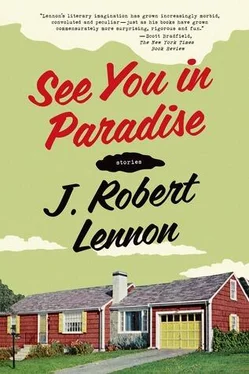“What kind of business? Have you seen Chloe?”
Mrs. Larsen tsked and let out an impatient sigh. “All in good time,” she said.

What, then, is the soul?
No, really. If there was one issue revivification raised that could not easily be resolved, it was this. If you believed in the soul, in heaven or hell, in eternal life, what did revivification tell you? On the face of it, not much. Revivs often could remember their death trauma and the events leading up to it, and they had no trouble remembering their return to life. But in between was a blank. None of them ever remembered a single moment. They didn’t even seem to have noticed the passing of time — there was death, and there was life, and nary a wisp of a dream intervened between the two.
One school of thought held that the revivs disproved the existence of the soul. They remembered nothing, the argument went, because there was nothing. When you’re dead, you’re dead. The restoration of life, then, was no big deal — it was like starting up a car. God was nowhere shaking his shaggy head in divine disapproval. There was only man and nature and eternal oblivion.
There was another school of thought, however, that regarded revivification as proof of the soul’s existence. The evidence was that the revivs were different. Something, the argument went, was missing. That thing was the soul. The revivs were zombies. Their souls were in heaven, or in hell, and what limped around on earth was an empty shell, a machine.
I had never been much for religion, but the second school certainly seemed to have a lot going for it. When asked to describe their revived friends and neighbors, when asked to choose a word that best characterized this new breed of human being, just about everybody said the same thing.
Soulless.

The Homburg was a hole in the wall, or more accurately, in the ground. It was in a basement underneath an art gallery, and had a cement floor, its concavity sloping toward a central drain, like a locker room shower. The walls were tile and the lights harsh and bare — yet the room was murky, its corners lost in darkness. Mismatched tables wobbled here and there, occupied by bored-looking hipsters, and I wondered how on earth someone like Ruth Larsen had heard about the place.
I saw her bony hand first — beckoning from a corner booth that was partially concealed by a curtain — and then her equally thin face, peering out from behind the fabric. I went to her. She had already ordered me something — a whiskey, neat.
“I’m sorry,” I said. “I don’t drink whiskey.”
“Drink it.” Her eyes were sunken and red and underslung with postman’s sacks, and her cowl of hair drooped like a broken umbrella. I did as she asked, dispensing with the drink in a single gulp.
“Gahhh,” I said.
“Now,” she muttered, peering once again behind the curtain, “let’s get to business.”
“Mrs. Larson,” I said. “Please. Can you just tell me if you’ve seen Chloe?”
She nodded. “Yes. I have seen Chloe. She is still in my house,” she spat. “She has quit her job and spends her days having sex with Dan.”
“Um,” I said. “Oh.”
“They drive about in his convertible, eat at restaurants, attend parties, and hump all night in his bedroom.”
“Okay …”
“On my husband’s dime.”
“I see.”
I suppose I knew all along that this was going on. But why him? Why Zombie Dan? He was without any redeeming qualities whatsoever. I hung my head. A little bit of whiskey seemed to be left in the bottom of my glass, and I held it upside down over my mouth for long seconds as it found its way out.
“I suppose you’re wondering what Dan has that you don’t. I suppose you’re thinking he’s not a real man. That he’s a zombie. That he has no soul.”
“Sort of,” I admitted.
“You’re full of anger.”
“I am pretty angry,” I said.
“Rage. You’re enraged. Well, I am here to tell you that I am, too.” “You are?” I asked her.
“Yes, I am. And I bet you’re wondering why. Well, it’s because that thing is not my son.” Her long finger emitted a faint, damp rattle as she waggled it in my face. “It is not my Daniel. It is a monster, and it must be stopped. It can read my thoughts. It remembers things about me that I worked very, very hard to forget. It is an offense against nature.”
“Well,” I said. “I wouldn’t call—”
“Those smug quacks! They knew it all along! All they wanted was another test subject — it’s all part of their stinking quest for knowledge.” She leaned closer. Her fingers, horribly dry, brushed my wrist. “It’s true about zombies, you know. They do eat brains.” She bit her lip, as if the thought had made her hungry. “Their souls are gone, so they want yours, and mine. They can steal them, right through thin air!”
She peered once more behind the curtain, then reached into her handbag. “And that,” she said, bringing out a small silver pistol and setting it on the table, “is why you’re going to kill him.”
I let out a little yelp. “Whoops! No, no, sorry …”
She shushed me, seizing my arm. “I paid to bring him here, and I will pay to send him back.”
“But that’s murder!”
Slowly, she shook her head. “That’s where you’re wrong. Killing a human being is murder. Killing a zombie is a public service. Especially one with dangerous powers. My son is dead, and his body has been stolen by a monster. A monster that is fucking your girlfriend.”
“I don’t think shooting Dan will get Chloe to like me again.”
“Chloe isn’t going to like you again anyway, you idiot,” she growled. “That’s not the point.”
I felt very strongly that I ought to leave, but something kept me there, even aside from Mrs. Larson’s death grip. Perhaps it was the whiskey. I felt slightly dizzy and very much open to suggestion.
“Did you slip something into my drink?” I asked.
“Yes, dear. Liquor.” She seemed to relax a bit and released me, leaving pale throbbing stripes on my numb wrist. I slowly dragged it into my lap. “You were about to ask me,” she went on, “what the point was of killing that … creature in my home.”
“What’s the point?” I obliged.
“Do you,” she asked me, “love your job?”
“I hate my job.”
“Do you love your employer?”
“I can’t stand her.”
“Would you prefer never to have to work again? Would you like to invite your employer to perform a sex act upon herself?”
I pictured a scenario of this variety, one that would beg to be followed up with an all-natural douche. I said, “I’d like that, yes.”
She pushed the little gun an inch closer. It made a sound like fingernails scraping the lid of a coffin.
“We’ll take care of everything,” Mrs. Larsen whispered, leaning close. “We have means. People like us always get a second chance. And now we’re giving you one.”
Slowly, gently, I reached out and picked up the gun.

In the taxi on the way to the apartment, I tried to get it all straight in my head. If the existence of the revivs meant there was no God, then revivs were as human as anyone else, which meant that killing one as wrong. But if the revivs, by their very soullessness, proved that God was real, then it was all right to kill them, because they weren’t human. But, given this logic, the existence of God made killing okay, and his nonexistence made it a sin. Somewhere I was missing something. I watched the buildings of the Avenue heave by outside as darkness brought their corners into sharp relief, and I considered just how unimportant it was — what I was about to do — to almost all of humanity, and how very much peculiarity the world seemed capable of absorbing.
Читать дальше













